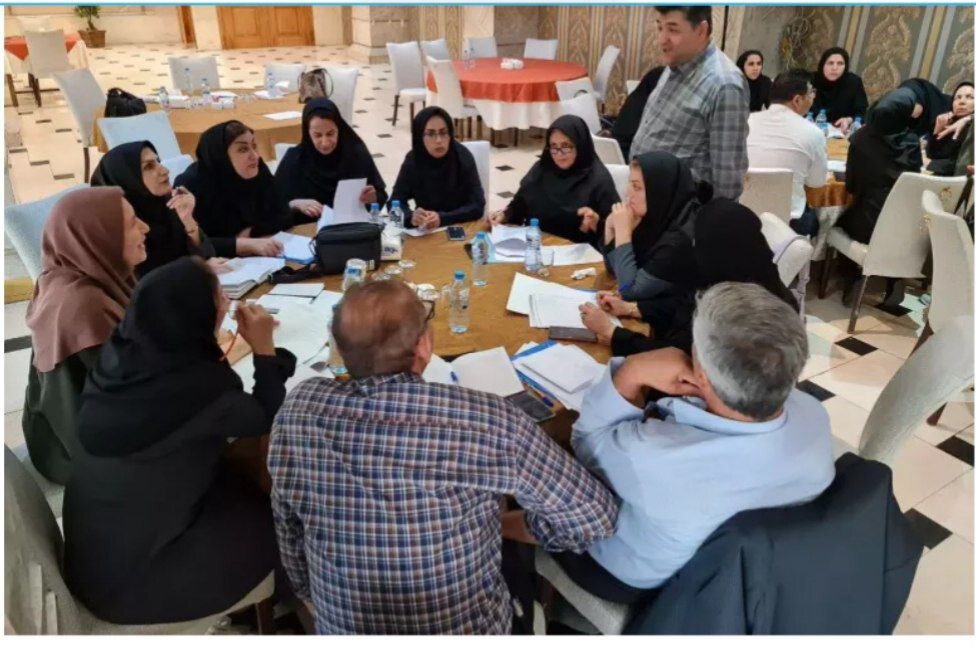Health ministry, UNICEF hold workshop on social, behavioral change

TEHRAN –During a three-day training workshop conducted by the health ministry and the United Nations Children's Fund (UNICEF), eighty experts from the Ministry’s health promotion departments were introduced to social and behavioral change (SBC).
The workshop was held in Tehran from August 17 to 21.
The participants, who were from different medical universities, trained on module one of a health promotion package during which they exchanged views and experiences on interpersonal communication, teaching, and facilitation skills for community engagement and efficient health promotion, the UNICEF website announced in a press release on August 28.
A number of health promotion experts from different provinces enhanced their knowledge and skills in interpersonal communication, behavioral change communication, and teaching and facilitation skills in the area of health promotion thanks to UNICEF support.
The trained health promotion experts will then disseminate what they have learned among hundreds of health volunteers in family settings across the country. The next step is the development and roll-out of the second and third modules of this training package which focus on human-centered design and SBC scientific approaches.
The package, which will also include a Monitoring and Evaluation framework, will then be integrated with the regular activities of the Ministry of Health’s health promotion department for further dissemination and cascade training among community health volunteers.
The above-mentioned health promotion package was developed under the leadership of renowned health experts, including Dr. Mohsen Shams, in close cooperation with UNICEF and the Ministry of Health’s health promotion department.
UNICEF is supporting the Ministry of Health in Iran to enhance its capacity to integrate SBC strategies and approaches in health promotion and education for improved efficiency and enhanced community engagement. Accordingly, UNICEF is supporting the Ministry of Health in reviewing its health promotion and education capacity-building training package.
Collaborative efforts in health sector
In May, the ministry of health in cooperation with UNICEF organized two training of trainers (ToT) workshops to help health experts boost their knowledge of media health literacy.
The workshops were held in Tehran in the first week of May.
Some 80 health education and health promotion experts from the ministry of health participated in the workshops.
The participants enhanced their knowledge and exchanged views on media health literacy to tackle misinformation and disinformation in different health-related areas.
Participants in this three-day ToT engaged in fruitful discussions on media health literacy and reviewed lessons learned in the past years, especially during the COVID-19 pandemic as well as charted the way forward.
In March, UNICEF supported the delivery of 564,000 doses of Pneumococcal Conjugate Vaccine (PCV) for the prevention of pneumococcal-related infections and deaths among children in Iran.
The measure was adopted in support of the introduction of PCV in the national childhood immunization program in the country, the UNICEF website reported on March 17.
The consignment was the first shipment of PCV to the country, using Iran’s financial resources left over from the procurement of COVID-19 vaccines, and delivered in collaboration with the Ministry of Health and Medical Education of the Islamic Republic of Iran, through UNICEF procurement services.
The shipment arrived from India and landed at Tehran’s Imam Khomeini International Airport on March 17.
In January, UNICEF in collaboration with the Ministry of Health and Medical Education enhanced the country’s vaccine cold chain system by providing walk-in cold rooms and refrigerated vehicles.
According to a press release by the UNICEF website on January 10, procuring, transporting, storing, and delivering vaccines to children in all corners of the world is a complex process that needs a well-functioning cold chain system.
Concerning the fact that the provision of standard immunization services to the community, especially children under five, is a key component of primary health care, in 2020, the Ministry of Health and Medical Education conducted an assessment in cities with more than 200,000 population to check the number of walk-in cold rooms for storing vaccines.
In 2023, considering the existing need for a strong cold chain system to preserve and maintain the quality and potency of vaccines nationwide, 19 medical universities were prioritized for the installation of walk-in cold rooms.
Inadequate walk-in cold rooms, population in each region, and climate conditions, which affect vaccine delivery and storage, are among the important factors in prioritizing an area
Funded by the European Civil Protection and Humanitarian Aid Office (ECHO), in the first phase, UNICEF in cooperation with the Ministry of Health and Medical Education installed nine walk-in cold rooms in the provinces of Isfahan, Hormozgan, East Azarbaijan, West Azarbaijan, Khorasan Razavi, Ardebil, Tehran, Sistan-Baluchestan and Chaharmahal-Bakhtiari.
In the second phase, to enhance the country’s vaccine cold chain system, UNICEF provided 17 high-quality refrigerated vehicles, which were distributed to medical universities in Jahrom, Sirjan, Dezful, Tehran, Rafsanjaan, Behbahan, Saveh, Kashan, Khoy, Qazvin, Semnan, Qom, Larestan, Shahrood, Babol, Chabahar, and Shahrekord provinces.
This initiative, funded by UNICEF’s Access to Covid-19 Tools Accelerator and Humanitarian Action for Children (ACT-A-HAC) UNICEF and Gavi, the vaccine alliance, will continue in 2024 with provision and installation of another 10 walk-in cold rooms across the country, the report added.
MT/MG
